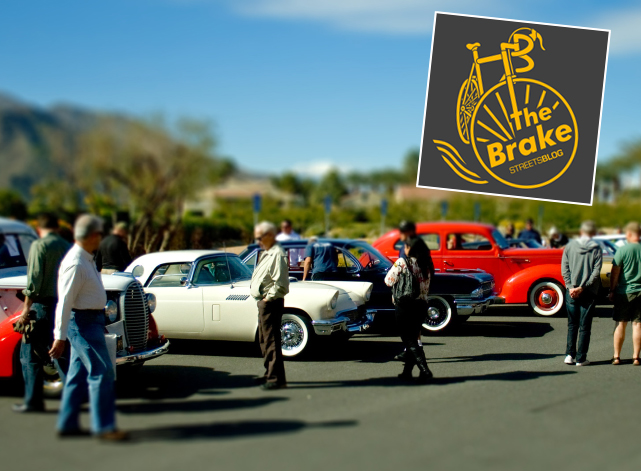Car culture is all around us. But is it really just about vehicles, roads, motorists and violent commercials on TV, or is it is a political system as deeply entrenched in cultures around the world as our governments, economic systems, and structures of oppression?
On this episode of the The Brake, we sat down with authors Robert Braun and Richard Randell to talk about their book Post Automobility Futures, and how our collective obsession with speed, efficiency, and ruthless technological progress has transformed the way we define what public space is for and what forms of violence we find acceptable. And they argue that this obsession began long before the automobile — and that getting beyond it will require dismantling a value system that is becoming more and more deep set, even as the car as we know it evolves.
This is part one of a two-part conversation; listen to part one below or on Apple Podcasts, and check back in two weeks for the second installment. And in the meantime, check out our earlier conversation with Braun and Randell about their work, or read a lightly edited excerpt of our conversation.
Kea Wilson: One thing that I think you drew out in a really interesting way in this book is how violence is so normalized under automobility, to the point where it's virtually guaranteed. But on the other hand, it's not like roads are lawless. In the United States, at least the act of driving is one of the most heavily-policed activities that people can do, particularly for socially and racially marginalized motorists.
You referenced a book that will probably be familiar to some Streetsblog readers, Policing the Open Road by Sarah Seo, which talks about how the birth of the automobile essentially converted the United States (and other areas of the world) into a police state. So help me unpack that: how is it possible that we have a world that is so violent, while also having so many police available to, ostensibly, stop the violence? And to take a particularly provocative phrase from your book: how does automobility provide "a blueprint for totalitarianism"?
Robert Braun: Well, this is the million dollar question ... The two most radical things that we're trying to say [in our book] is, one, that automobility is not about the car or the automobile. And it's not even about the road. It's a hegemonic space that has multiple and multiform violence at its core.
And the second [radical thing we want to say] that you quoted is that automobility is actually a blueprint for totalitarianism. Taking it one step further, we'd say that it actually is a totalitarian order with fascist traits. And we chose our words very carefully.
So beyond the obvious, there is a lot of command and control involved in how the [automobility] space is ordered. And it's no surprise; fascist and totalitarian states do a lot of violence, as we know from our history classes. Both within Nazism and the Italian Fascist versions of totalitarianism, but also within communist countries, [totalitarian leaders] have meted out a lot of violence to multiple groups and individuals.
But beyond that, what we tried to do is state the definition of fascism as a community as an organic entity, with a bellicose mission to achieve grandeur, power, and conquest. And it is a political order that represses the individual and the masses to create the revolutionary new order, that actually guarantees that class divisions and private property remains. There is a certain form of mystic unity among man that are waging war against the infidel.
And you know, if you translate this to what's going on [in automobility] ... it's full of command and control. It's full of policing. It's full of oppression, and more importantly — and this is what Sarah Seo has so eloquently proven — that stop and frisk and all the interventions that the police do actually result in, again, contingent violence. Contingent violence not only that is related to driving, or moving, or transportation, but also just being in automobility, finding drugs, searching your car, stopping you on the street with an assumption, a belief that you do or you may commit a crime, and then finding the crime.
So I don't want to get philosophical here, but it is, it is a form of what another philosopher called [Brian] Massumi calls ontopower. It creates crime, actually, by stopping and frisking and searching and and assuming that all people in automobility are potential criminals who may, could, should commit a crime — and the role of the police is to stop this imaginary crime from happening.






